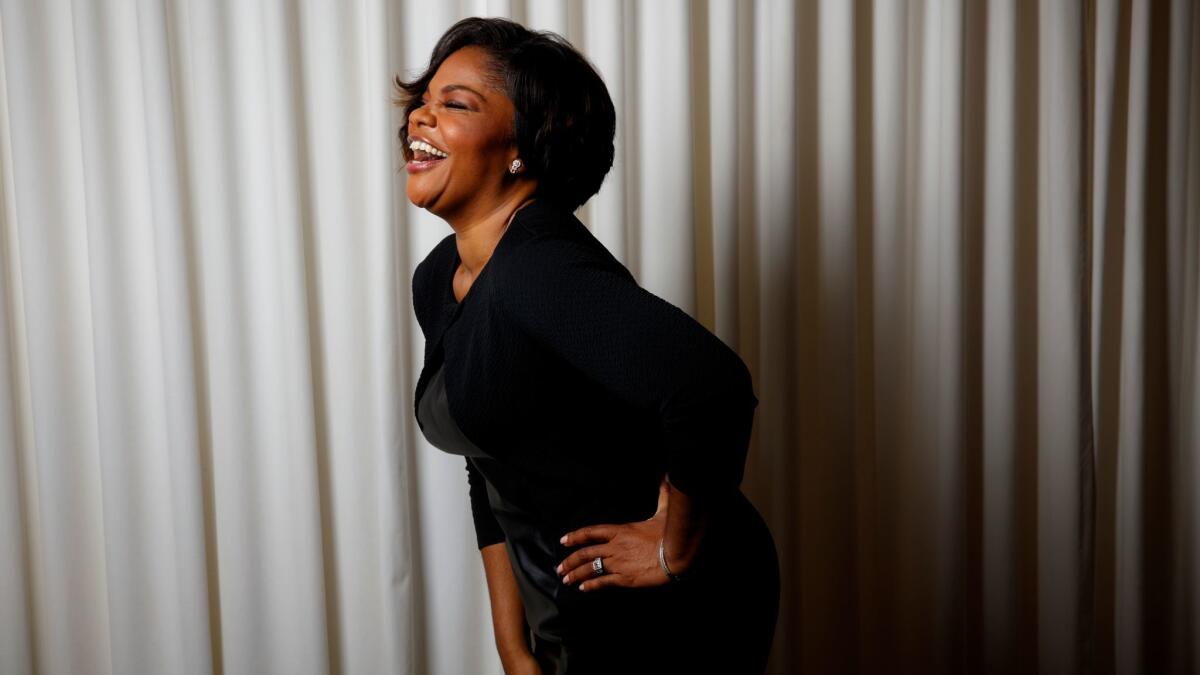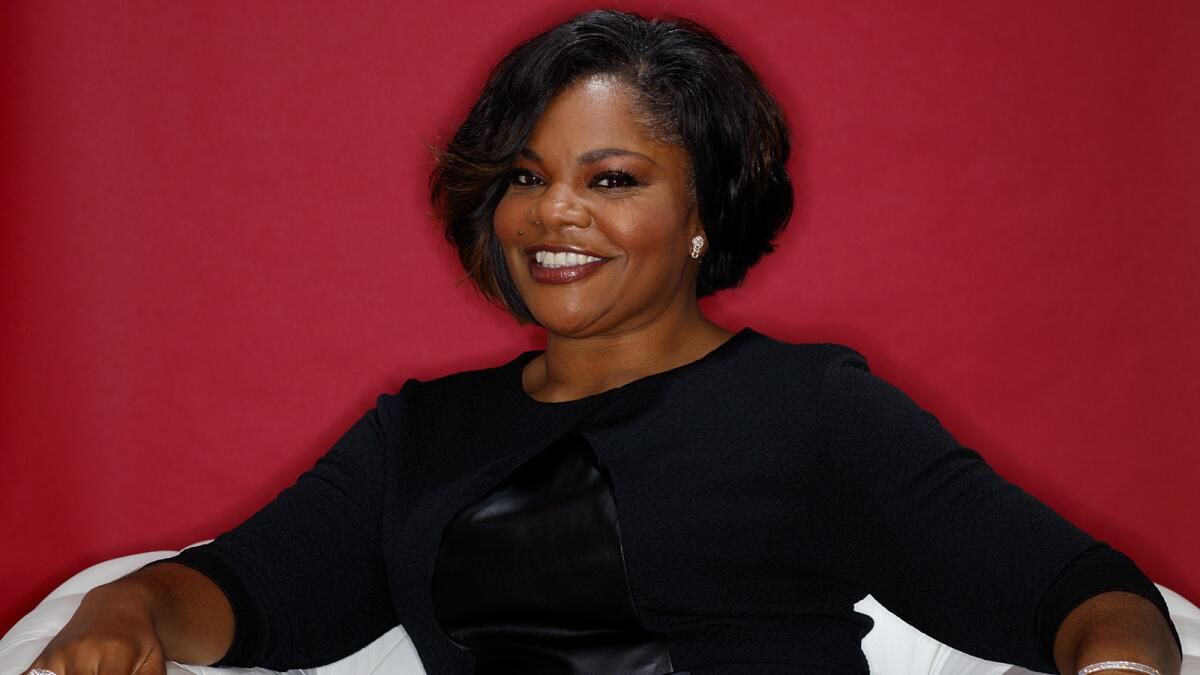After getting ‘blackballed’ in the wake of her Oscar win, Mo’Nique returns to comedy with ‘Almost Christmas’

If Mo’Nique has learned anything in the 17 years since she began gracing screens large and small, the idea to not judge a role is what has stuck with her. She didn’t judge Claire Rousseau, the conservative mom of a gay teen grappling with his religion and sexuality in Patrik-Ian Polk’s 2014 indie “Blackbird.” She didn’t judge Ma Rainey, her role in last year’s HBO biopic “Bessie” for which she earned an Emmy nomination. And she didn’t judge Mary Lee Johnston, the verbally and physically abusive mother in 2009’s “Precious” for which she won an Oscar.
But these three roles, representative of a dramatic bent many in Hollywood didn’t think the comedian could muster or master, are vastly different from her latest as the high-spirited, slick-talking Aunt May in the holiday comedy “Almost Christmas” in theaters Friday. Or at least that’s what the industry might think.
For Mo’Nique, however, the line between drama and comedy, of which this latest role is a return of sorts nearly 10 years later, is nonexistent.
“When people say, ‘What’s the difference [between drama and comedy roles]?’ there is none,” she said. “It is still this little fat black girl from Baltimore, Md. When people say, ‘Return [to comedy] -- I do things that make sense. I don’t know if it’s a ‘return’; it just hasn’t made sense in a long time.”
Until now.
“Almost Christmas,” from writer-director David E. Talbert, follows a dysfunctional family as they gather for the first Christmas since their mom died. Danny Glover plays the dad, Walter, while a cast including Gabrielle Union, Jessie T. Usher, Nicole Ari Parker, Omar Epps, J.B. Smoove, Romany Malco and Kimberly Elise play his children and their spouses. The film also stars budding comedian and Internet personality D.C. Young Fly and singer Keri Hilson.
In part, the reason Mo’Nique, 48, chose to play Aunt May is based on her and her husband-manager Sidney Hicks’ relationship with Talbert. The two men lived across the hall from each other while students at Baltimore’s Morgan State University, and since Mo’Nique and Hicks have known each other since they were teens, the trio have long been friends.
“We remember this cat from way back in the day doing these plays,” said Mo’Nique, referencing Talbert’s start in the entertainment industry as a playwright, producer and director nearly 25 years ago. His stage work, some of the leading productions in urban theater, often address relationships, love and religion, playing to mostly black audiences. He’s since become a filmmaker, his first two feature films being 2008’s “First Sunday” and 2013’s “Baggage Claim.”
“We were just so proud of that baby,” Mo’Nique said about Talbert. “That’s why [I took the role]. You applaud someone that’s stayed in the game so long.”
While Aunt May was supposed to be an extended cameo — with about five or six lines, Talbert said — by the time Mo’Nique finished reading, or taking comedic jabs at, her scene mates, her role had become central to the movie. Many of her lines in the final film are improvised.
“She’s a tour de force,” Talbert said. “Tears were in my eyes at the monitor [watching] because I was trying not to ruin the takes by laughing.”
But what can one expect from someone whose career foundation was built on stages of small comedy clubs —whose chops were chronicled in the 2001 stand-up concert film “The Queens of Comedy” — and as the lead of the TV comedy “The Parkers” from 1999-2004 ? For Talbert, her hiatus from comedy on film -- she continues to sell out stand-up shows — means nothing regarding the talent that persists.
“Comedians are like prizefighters, they’ve always got that knockout punch,” he said. “I knew all we had to do was put her in the right environment and it’s like muscle memory. It snaps right back in, and she fired on all cylinders from take one.”
Mo’Nique also credited being able to watch and work with Glover for why she took the “Almost Christmas” role. “To watch Danny Glover be the patriarch not only of this film, but of the set, we knew we were amongst a legend, our living icon, and he didn’t disappoint,” she said.
But as for how she’s choosing other roles, whether they be comedic or dramatic, “making sense” comes back into play.
“And what I mean is it must make dollars and sense,” she said, “because oftentimes we get paid in compliments. I can’t take that to Kroger. I cannot walk up in there and say, ‘Listen, you know they thought I was good. Can you please ring up them Tastykakes?’”
Verbalizing such a perspective has gotten the actress in what some might call trouble, last year capturing major headlines for a public disagreement with “Precious” director Lee Daniels. (Mo’Nique asserted that she had been “blackballed,” per Daniels, by the industry for being “difficult” and “tacky” in refusing to campaign for her eventual Oscar win.) It is however a byproduct of the commitment she’s made to herself and her family to stay “honest.” The benefit is, according to Hicks, that “when you cannot get caught up in the fantasy [of Hollywood] because the reality is always going to be waiting there for you, it allows you to function at a higher level.”

There are some people in Hollywood who just want to do good work. That’s why I keep going. Because we’re going to meet them.”
Mo’Nique added: “There are other honest people out there. There are some people in Hollywood who just want to do good work. That’s why I keep going. Because we’re going to meet them.”
Along the way, Mo’Nique and her husband have begun making moves behind the screen as producers of their own content, an effort to “be in control of our tomorrow,” she said. The couple were executive producers of “Blackbird” and 2015’s “Interwoven” and have also created a stand-up special, “Monique’s: Something Different,” now streaming on Amazon. They also have a podcast called “Mo’Nique & Sidney’s Open Relationship.”
“We can’t keep allowing people to take our images and feed their generations to come,” Mo’Nique said. “When our children’s children come along and [see my image], well, we want to own that.”
Creating these projects is also a way, Hicks said, for them to be “proactive” in diversifying Mo’Nique’s opportunities in the industry so that she too can join the likes of Melissa McCarthy and Amy Schumer who as funny women are getting their “just due.”
“They’re getting a just due that for Mo’Nique — and not just her, but other actors of color — is not had,” he said. “Granted, we both were told early on [that] no one owes you anything. You owe it to yourself. So, we wanted to put ourselves in a situation where we can take advantage of the opportunities that are out there, those we create and those that others may want us to participate in.
“Because the same opportunities that are available to her Caucasian contemporaries don’t seem to be available to her at this juncture,” Hicks said of his Oscar-winning wife. “However, we humbly believe there is a reason why you have to go through what you go through. Those behind the machine [of Hollywood] are going to get it, perhaps just from seeing this movie, and begin to say there’s something to this young lady.”
Luckily for Mo’Nique, always in the back of her mind are the stories of black women in the industry who have come before her, like Hattie McDaniel and Louise Beavers, “all those sistas that made it so that this little fat black girl could have different opportunities.”
“When I look and read their stories, they kept going,” she said. “Through all the adversity, unfairness, inequality, the lack of fair pay... they hung in there.”
And so shall she.
Get your life! Follow me on Twitter: @TrevellAnderson.
More to Read
Only good movies
Get the Indie Focus newsletter, Mark Olsen's weekly guide to the world of cinema.
You may occasionally receive promotional content from the Los Angeles Times.











